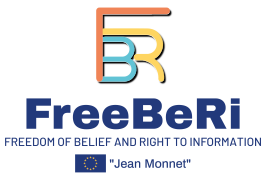FreeBeRI for third mission
Target students: upper secondary schools
Duration: 4 hours
Conspiracy fantasies. What they are, why they work, how to unmask them.
What are conspiracy fantasies: fake news, conspiracy theories and post-truths are terms in common use today that this seminar aims to clarify, showing how they do not refer to completely new phenomena. Through some historical examples, students will have the opportunity to realize how conspiracy fantasies have also had a profound political, social and cultural impact in the past. At the same time, the aim of the course is also to show the specificity of today’s conspiracy fantasies, their relationship with the so-called “new” media and the resulting threats to democratic participation processes.
Why do they work?: what is the reason for the success of conspiracy fantasies? Why are they given credit? To answer these questions, we will try to understand how this complex interpretative machine works which, by mixing falsehood and verisimilitude, deludes us into making ourselves understood and therefore of being able to face realities that we perceive as incomprehensible and/or unacceptable.
How to unmask them: the final part of the course aims to provide tools for recognizing conspiracy fantasies. These tools are mainly taken from the toolbox of the “historian’s profession” and will serve us to distinguish and contextualize the sources through which we inform ourselves. At the same time, we will also see what tools the European Union has equipped itself with to prevent and counter the spread of fake news and conspiracy fantasies in order to protect the solidity of democratic participation processes.
Lecturer: Silvia Cristofori is an associate professor at the Link Campus University where she teaches “Media and Religions” and “Religions, Politics and Identities”. She is affiliated researcher of FSCIRE, national research infrastructure for historical-religious studies and member of the teaching staff of the national doctorate DREST (Italian Doctoral School of Religious Studies). She directs the European research project FreeBeRI (Freedom of Belief Right to Information). His research work is characterized by a strongly interdisciplinary approach, including field and archive research conducted between Rwanda, Senegal, Italy, France and the United States.
The project: this path dedicated to upper secondary school students is part of the dissemination activities of the FreeBeRI (Freedom of Belief Right to Information) research project, winner of the Jean Monnet tender which aims to promote studies on European Union.
